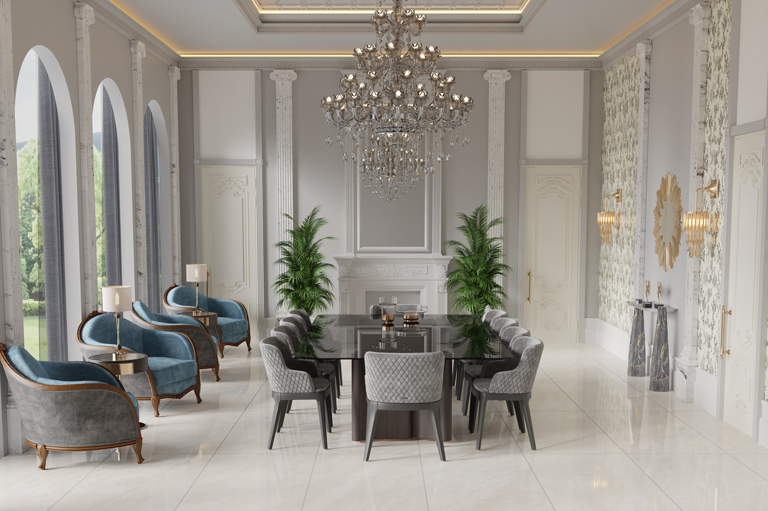Tiles should be coordinated with the decoration style, objects, colors, shapes present in the environment, and activities performed in it. They should also be in harmony with environmental features such as shape, dimensions, space, and lighting. This choice depends on personal taste and fashion. Therefore, imposing specific rules and laws in tile selection does not seem very correct.
Technical considerations to be taken into account:
Tiles should have technical features suitable for the environment and be resistant to mechanical stress, thermal stress, chemicals, etc. In other words, the higher the likelihood of stress in the environment, the higher the tile resistance should be.
It is better to look at a few concrete examples: first, we will look at suitable tiles for different parts of the house and then discuss points regarding selecting the most suitable floor tiles for public places and factories.
Floor tiles in building entrances (for non-public areas):
The amount of traffic and stress that tiles endure in the entrances of houses varies from one building to another. The entrance of a house is where the highest volume of traffic occurs. The wear and tear of tiles also depend on the location of the house. For example, the entrance hall of an apartment on the fifth floor is different from a villa where the courtyard floor is covered with sand or gravel. In the latter case, wear and tear due to friction are significantly higher. Therefore, it is essential to choose tiles that have higher resistance to wear.
Floor and wall tiles in bathrooms and toilets:
Floor and wall tiles in bathrooms and toilets come into contact with chemical staining agents (such as hygiene products, cosmetics, perfumes, etc.) and cleaners. Therefore, it is better to use tiles in bathrooms and toilets that have high resistance to chemical substances, especially acids and alkalis.
Kitchen floor and wall tiles:
The most significant impact and abrasion are related to kitchen floor tiles. The kitchen floor is exposed to the highest levels of contamination and grease stains, so it needs to be cleaned more carefully than other areas. The kitchen floor is also prone to objects falling on it, so kitchen floor tiles should have the highest mechanical resistance and resistance to chemical substances. Although kitchen wall tiles are subject to less mechanical stress, they require very high chemical resistance due to exposure to chemical stress from cooking and cleaning agents.
Floor and wall tiles in outdoor spaces:
tiles that are resistant to freezing. These tiles are usually formed by pressing and have low water absorption, they may be glazed (single-fired), unglazed porcelain stoneware, or even extruded (clinker or koto). Tiles made according to ISO 13006 standard, which are formed by pressing, should have water absorption below 3% or in other words be selected from group BIb. In Iranian standard 25, these tiles are recognized as group 1.
Floor tiles in public places:
In public places, there are higher chemical and mechanical stresses compared to non-public places like residential homes. In these places, aesthetic considerations should also be taken into account. Very strong, abrasion-resistant, chemically resistant tiles with low stain absorption should be used in these places. Glazed glossy tiles are particularly appealing in such locations. It is important to note that while polished porcelain tiles are attractive for places like restaurants, their surfaces may become scratched and lose their gloss over time.






